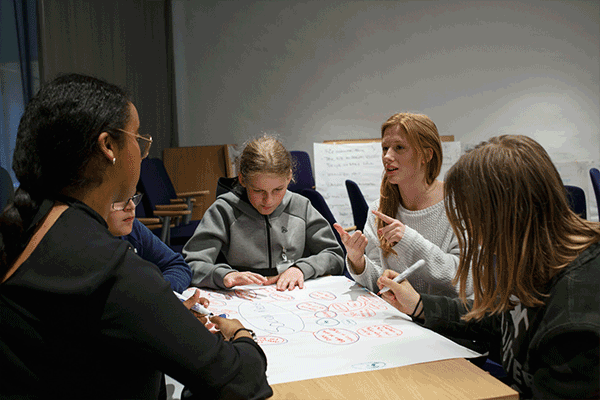You’ve probably heard it before: the key to success in
your exams at school is to study regularly throughout the year, rather than
leaving everything to the night before the exam.
Easy, right?
It’s a pretty simple concept, but very difficult to
actually do. If your exams are in October, taking the time out in March to
study for a goal that seems so far away is a lot harder than it sounds, even if
you start the school year with the best of intentions.
Ultimately, if you don’t have a plan of attack for how
you’ll consistently study throughout the year, it’s likely that other things
will get in the way. Extracurriculars, time spent with your family, seeing
friends, school events – these are all great things to do, but if left
unchecked, they’ll eat away at your calendar until there’s no time left for
study.
To get on top of things, the best way is to make a habit
out of studying. Again, this is easier said than done, so we’ve pulled together
a practical guide on how to make studying a regular part of your life.

What’s a habit?
A habit is something that you regularly do, and that
happens unconsciously. In other words, you do it without continually
having to remind yourself.
For example, you probably brush your teeth every night
before bed. You probably also don’t think too much about it – it’s just
something you do, and there’s no danger of forgetting about it. This is because
brushing your teeth has become a habit, or a part of your evening routine.
Anything can become a habit, if you want it to. Read
on to find out how!
How do I build a habit?
Conventional wisdom states that it takes 21 days to
build (or break) a habit. This means that if you consciously add an activity to
your routine every day for about three weeks, by the end of that period you
won’t have to think about it any more.
In the case of studying, you might want to find
anywhere between 15 minutes and a couple of hours every night for three weeks.
This should be at a time when you know you’ll be free, which you can dedicate
to sitting down and studying.
If you do this consistently, then after around three
weeks you’ll find yourself naturally sitting down to study at that time without
having to actively remind yourself.

Information retention
One of the great things about studying consistently
every day is that it helps immensely with memory, and retaining the information
you learn in class.
By reviewing the information you’ve learnt in class,
only hours after hearing it for the first time, you’re effectively telling your
brain that it’s important, and should be remembered. This doesn’t need to take
long – a great start is to simply read over your notes from class, and write a
quick summary of everything you learnt in your own words.
As a result, your brain will carve out deeper pathways
for the information you’ve learnt, and you’ll find it much easier to recall
when you’re in that test or exam.
It’s all about prioritisation
When it comes to building a habit, the trick is
consistency.
What this means is that it’s not so much about how long
you spend studying, but the fact that you do it almost every day. It’ll take
much longer to build a habit if, for example, you decide to do all your week’s
study for a few hours on a Tuesday evening.
This means you need to prioritise getting your daily
study session in. Work it around your schedule – for example, if you’ve got
sports practice one afternoon, then you might want to schedule a shorter study
session later in the evening. But don’t let everything in your life get ahead
of you. We know, it’s tough to find the discipline to put your phone down, but
this will definitely pay off come exam time!

Building in flexibility
This is all very well, but happens when you’ve got
something important on and truly can’t study – maybe a family dinner, or band
practice goes late? What if being strict about your study habits in this
situation would mean that you have to compromise on sleep, or your mental
wellbeing?
Well, it’s important to remember that a habit is
something that you unconsciously do. That means that it’s OK to make a conscious
decision, from time to time, to skip study for the evening if something more
important comes up.
After all, study is important, but there are certainly
other important things in life (like family and friends) that shouldn’t suffer
because you want to get good grades at all costs.
A few things to clarify here. Firstly, flexibility
only works if you’re strict with yourself most of the time. If you’re consistently
looking for reasons to skip studying, then you haven’t built a study habit,
you’ve built a habit of making excuses! You need to ensure that only truly
important things take priority over your study.
Secondly, whenever you have a night off, it’s
important to consciously decide to take a break, rather than just never
getting around to your work and eventually falling asleep.
You might even want to say out loud to yourself:
“Tonight I’m going to take a break from studying, because… (I’m seeing family/it’s
my friend’s birthday/I haven’t been getting enough sleep lately)”. That
way, you can take your break without feeling guilty about it.
And finally, remember that taking a break only applies
to the extra study that you set for yourself. If your teacher has asked you to
complete homework, this still needs to be done!

Putting it all together
To conclude, if you’re able to make a study habit
which sees you study consistently for a set period of time, every night, you’ll
start to see some seriously quick improvements in your content knowledge and
information retention.
At EduExperts, we’re passionate about helping students
achieve their full potential. We’ve got programmes for students of all levels,
and all abilities. Get in touch with your local centre
today to learn more!










